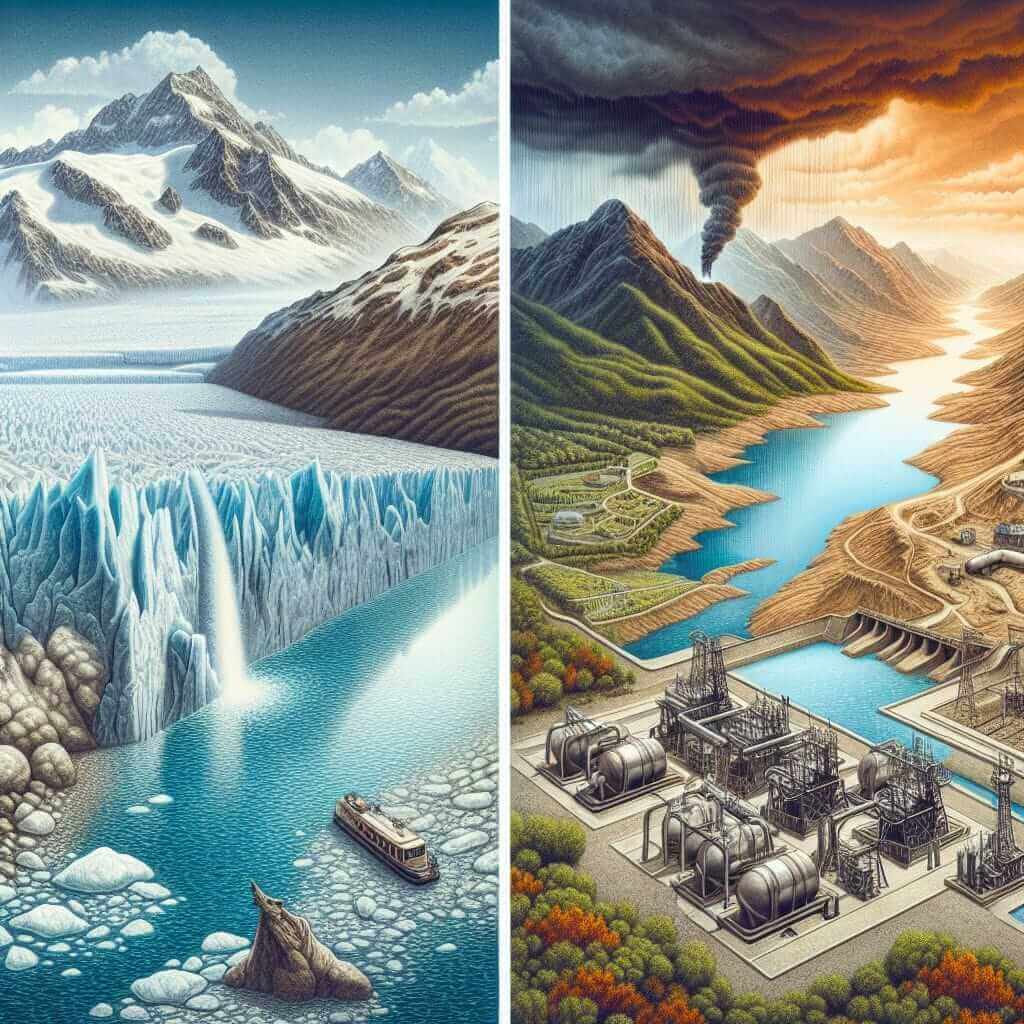The reading section of the IELTS exam tests your ability to understand and interpret academic texts. Themes related to climate change are increasingly common in recent examinations due to their relevance and global significance. One such theme is “How is climate change influencing water resource management?” This topic encapsulates a range of issues from changing precipitation patterns to water scarcity and ecosystem impacts, which makes it a critical subject to understand and prepare for.
Full-Length IELTS Reading Passage: Hard Text
How is Climate Change Influencing Water Resource Management?
Climate change profoundly impacts global water resources. As the planet warms, the hydrological cycle intensifies, leading to more extreme weather patterns. This shifts precipitation distribution, causing both severe droughts and floods.
A significant area of concern is the melting of glaciers and polar ice caps. These ice masses store vast quantities of freshwater. Their accelerated melting due to rising temperatures contributes to rising sea levels. This not only threatens coastal areas but also impacts freshwater resources, as saltwater intrusion contaminates aquifers in coastal regions.
Climate change also influences the frequency and intensity of extreme weather events like hurricanes and typhoons. These events can devastate water supply systems and contaminate freshwater sources. Additionally, altered weather patterns result in prolonged droughts in some regions and acute water scarcity, which affects agriculture, energy production, and daily human consumption.
Water management strategies must adapt to these changes. One approach is the development of more resilient infrastructure, such as the construction of reservoirs and flood controls. Countries are also investing in advanced technologies, such as desalination and wastewater treatment, to enhance water supply. Efficient use and conservation of water resources are vital aspects of contemporary water management practices.
Climate change-induced water scarcity has geopolitical implications as well. Regions sharing transboundary water resources may face conflicts over water allocation. International treaties and cooperative management agreements can help mitigate these risks, promoting sustainable and equitable use of water resources.
Ultimately, understanding the repercussions of climate change on water resources is crucial. Coordinated global efforts are necessary to manage these impacts and ensure water security for future generations.
Questions
Multiple Choice
-
What is the primary cause of the intensification of the hydrological cycle?
- A. Rising temperatures
- B. Melting glaciers
- C. Coastal erosion
- D. Water scarcity
-
Which of the following is NOT mentioned as an effect of melting glaciers?
- A. Rising sea levels
- B. Saltwater intrusion
- C. Increase in freshwater availability
- D. Threats to coastal areas
True/False/Not Given
- Climate change has no effect on the frequency of extreme weather events.
- Desalination is mentioned as a solution to enhance water supply.
- Transboundary water resources have caused conflicts in some regions.
Matching Headings
Match the following headings with the appropriate sections from the passage:
- A. Infrastructure Development
- B. Geopolitical Implications
- C. Effects on Agriculture and Energy Production
Answer Keys
-
A. Rising temperatures
Explanation: The passage states, “As the planet warms, the hydrological cycle intensifies,” indicating that rising temperatures are the primary cause. -
C. Increase in freshwater availability
Explanation: While the passage discusses the detrimental effects like rising sea levels and saltwater intrusion, it does not mention an increase in freshwater availability. -
False
Explanation: The passage explicitly states that climate change affects the frequency and intensity of extreme weather events. -
True
Explanation: The passage mentions, “Countries are also investing in advanced technologies, such as desalination…to enhance water supply.” -
True
Explanation: The passage discusses potential conflicts over water allocation among regions sharing transboundary water resources. -
A. Infrastructure Development
Explanation: The section discusses developing resilient infrastructure like reservoirs and flood controls. -
B. Geopolitical Implications
Explanation: The section details the geopolitical risks and necessary treaties for managing shared water resources. -
C. Effects on Agriculture and Energy Production
Explanation: The passage includes a note on climate change impacting agriculture and energy production due to water scarcity.
Common Mistakes
- Overlooking key details such as the causes of hydrological cycle intensification.
- Misinterpreting the effects of melting glaciers.
- Ignoring specific mentions of solutions like desalination.
- Confusing different aspects of infrastructure development and geopolitical implications.
Vocabulary
- Hydrological Cycle (noun) /ˌhʌɪ.drəˈlɒ.dʒɪ.kəl/ – The circulation of water in various forms throughout the Earth’s systems.
- Desalination (noun) /diːˌsælɪˈneɪʃn/ – The process of removing salt from seawater to make it usable.
- Transboundary (adjective) /trænsˈbaʊn.dər.i/ – Extending across or existing on both sides of a boundary.
Grammar Point
- Passive Voice: Passive voice is often used in academic writing to focus on the action rather than the subject performing the action. For example: “Water management strategies must adapt to these changes.”
- Structure: Subject + auxiliary verb (be) + past participle (by + agent).
- Example: The effects of climate change on water resources are widely studied by scientists.
Advice for High IELTS Reading Scores
- Practice Regularly: Familiarize yourself with a variety of academic texts.
- Time Management: Allocate your time wisely across different sections.
- Skim and Scan: Develop techniques for quick information retrieval.
- Understand Question Types: Acquaint yourself with various question formats and strategies to tackle them efficiently.

By focusing on these strategies and understanding the potential topics, you’ll be in a much stronger position to excel in the Reading section of your IELTS exam. Good luck!